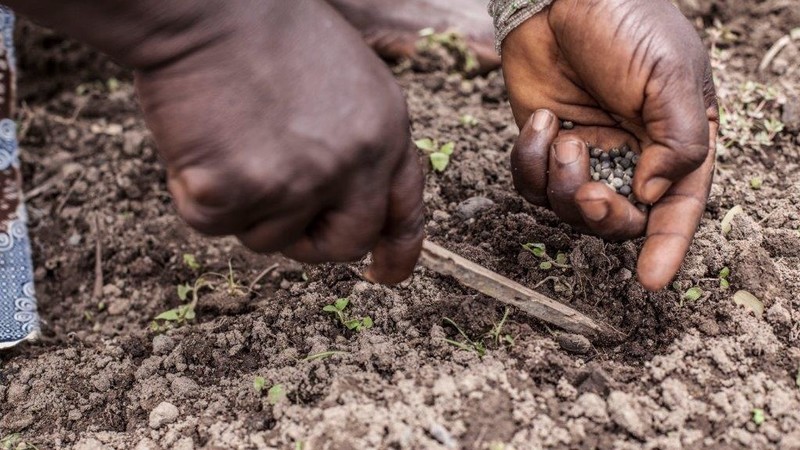Food and farming from Genesis to the modern day

Francis Stewart from our Theology Programme reflects on the issues with our farming and food systems and how they can be seen to stretch right back to biblical times.
It is Eastertide and time for feasting. May especially is a month of feasts celebrating those who are often taken for granted. It begins with a day dedicated to workers and an opportunity for Catholics to remember the dignity of work through St Joseph, patron of workers. It ends with a feast celebrating two Biblical mothers, marking the Visitation of Mary to her cousin Elizabeth.
St Isidore the farm-worker
In the middle of these two feasts, on 15 May, there is a day dedicated to the lesser-known figure, St Isidore the farm-worker. For many Spaniards, Filipinos and Hondurans, this is an occasion for colourful carnival, procession and partying.

St Isidore lived in Spain in the eleventh and twelfth centuries and worked on the estate of a wealthy landowner. The folklore surrounding him and his wife Maria celebrates simplicity, abundance and friendship with the poor. Though they weren’t rich in possessions, Maria is said to have had a pot of stew always on the stove to cater for anyone who had need. On one occasion, when there was a particularly large number of guests, her stew was miraculously replenished.
As a farming role-model, Isidore seems remarkably laid-back. According to legend, angels arrived to push his plough when he lingered at morning Mass. On one particularly frosty morning, on his way to the mill, he allegedly took pity on some wood pigeons pecking at the hard earth in vain. Pausing, he scattered some of his grain for the birds, prompting mockery from passers-by. The story has it that by the time he’d reached the mill, the grain he’d scattered was replenished. And, when it was ground, produced double the expected amount of flour.
The stories of Isidore and Maria are meant to be exaggerated and embellished, relived through traditional dress, music and, of course, food and drink. And St Isidore helps us to remember those agricultural labourers who make feasting possible.
Cursed ground
But the harsh realities and hard labour of agriculture are not reflected by these legends of bounteous yields. Neither do these stories reflect the demonic paradox of the global food system today – the fact that many of the people who grow the world’s food struggle to get enough to eat.

Nurjahan in Bangladesh with vegetables she has grown in protected sacks.
The first books of the Bible might resonate better with the farming experience. Humanity’s fate to “till the earth” first appears in Genesis 3 as a curse. It is a symptom of estrangement from the life of innocence, plenty and communion in the garden of Eden. Once they have left Eden, hardship and trouble stalks human beings. Existence is now exposed to floods, famines and droughts. Conflicts arise from the tensions between the nomadic pastoral way of life and the growth of large agricultural empires. The book of Genesis ends with the reconciliation between Joseph, the dreamer, and his brothers in Egypt. But they also exchange their nomadic way of life for the security of Pharoah’s grain. The book of Exodus then begins at the end of a ‘slippery slope’ of tilling the land: a new king of Egypt makes the Israelites slaves.
Production without rest
The picture of ancient Egypt at the beginning of the book of Exodus is a good sketch of certain features of our current global food system. It shows the relentless exploitation of the land to produce a crop on a massive scale. This crop is not equitably shared according to need, but is put in storehouses for the enrichment of the powerful. Such a system depends upon the labour of people without proper right or autonomy.
Also notice Pharoah’s attitude to time. When Moses first commands “let my people go”, he is not demanding that the Israelites are freed, but simply asking for a holiday. They wish to spend a day in the desert to sacrifice to their Lord. All they want is a Sabbath from their work. Pharoah refuses. His Empire cannot afford a Sabbath.
This may seem an exaggerated caricature of today’s world. Nonetheless, the era of industrial-scale agriculture that we are in is premised on production without rest. Traditional farming before the seventeenth century involved the rotation of crops and fallow periods in order to allow natural soil fertility to replenish. Agricultural production was not always a 24-7 process.
Find out more about the issues with our global food system today.
Various innovations have sought to make the fallow period productive. In the early twentieth century, Fritz Haber invented the ultimate artificial means of fixing nutrients into the soil: ammonium nitrate fertilizer. The munitions factories of the Second World War produced explosives with the same chemicals used to make this fertilizer. So, when the war ended, they were simply able to pivot to serve the agricultural market. Thus began a post-War era of cheap food production, a 24-7, Sabbath-less system.
Reimagining the food system
It must be admitted that many of us have experienced the era of industrial-scale agriculture as a time of plenty, despite having the ecological ill-effects in the back of our minds.
Nevertheless, the costs have been alienation from the sources of our food and dependence upon supermarkets, to the detriment of small shops and producers.

Worse, globally, the diabolical diversity of the supermarket shelves veils a system that forces small producers and subsistence farmers into growing for export and dependence upon agribusinesses who patent seeds and push harmful fertilizers.
This is why it is time for us to imagine a new way forward. You are invited to join with us in this re-imagining.